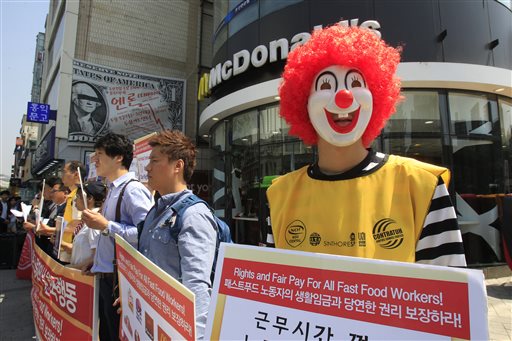
A protester dressed as Ronald McDonald participates in a rally to demand higher wages for fast-food workers outside a McDonald restaurant in Seoul, South Korea, Thursday, May 15, 2014. About 30 labor union members joined the global action to ask higher pay for part-time workers.AP
NEW YORK — Labor organizers are turning up the heat on McDonald’s and other fast-food chains to raise worker pay, with protests set to spread to more than 30 countries Thursday.
The demonstrations build on a campaign by unions to bring attention to the plight of low-wage workers and get the public behind the idea of a $15-an-hour wage. Businesses say such pay hikes would hurt their ability to create jobs.
The protests are being backed by the Service Employees International Union, which represents more than 2 million members, and began in late 2012. Since then, organizers have steadily intensified actions to keep the issue in the spotlight.
In March, for instance, lawsuits filed in three states accused McDonald’s of engaging in practices that deprive workers of their rightful wages, such as the denial of breaks and overtime pay. Workers were referred to lawyers by union organizers, who announced protests over “wage theft” the following week.
Protest turnouts have varied widely in the U.S., and the actions planned for overseas Thursday also differed depending on the country.
The campaign has nevertheless captured national media attention at a time when the gap between the rich and poor has widened, and compensation for CEOs has come under greater scrutiny. It also comes as President Barack Obama works to raise the federal minimum wage to $10.10 an hour. The current rate of $7.25 an hour, which was last raised in 2009, translates to about $15,000 a year for a full-time job.
Last week, workers and union representatives from countries including Argentina, China, El Salvador, France, Ireland and the United Kingdom met in New York City to strategize for the first day of global actions. The meeting was led by the International Union of Food, Agricultural, Hotel, Restaurant, Catering, Tobacco and Allied Workers’ Associations.
Still, fast-food workers have historically been considered difficult to unionize because many are part-timers or teenagers who don’t stay on the job for long. Also complicating matters is that the majority of fast-food restaurants in the U.S. are owned by franchisees who say they’re already operating on thin profit margins.
In a statement, the National Restaurant Association called the actions “nothing more than big labor’s attempt to push their own agenda.”
The industry group said that rather than “demonizing” companies, the focus should instead be on “increased access to education and job training opportunities.”
RELATED STORIES
Canada halts fast-food industry access to Temporary Foreign Worker program
Jollibee putting up shop in UAE
Jollibee hopes to topple Japan firm as Asia’s largest